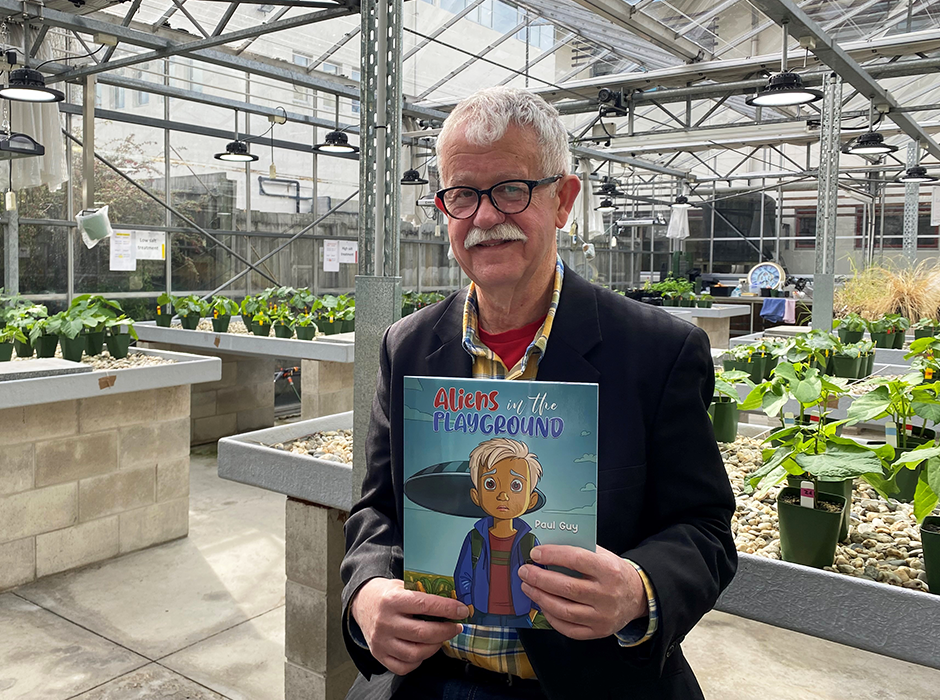
Paul Guy shares his love for botany in his new children’s book Aliens in the Playground. In the background, botany students' experiments on the effects of soil salt levels on plant growth, in the glasshouse on campus.
Plant blindness is a growing concern, and one Otago academic has set out to do something about it.
The term, coined in 1998 by American botanists Elisabeth Schussler and James Wandersee, refers to the inability to see or notice the plants in one’s own environment.
Associate Professor Paul Guy, of Otago’s Department of Botany, says it’s concerning how most people don’t appreciate or know where their food comes from, and the role plants play in our everyday lives.
Add to this his experience of his daughters’ limited exposure to plant biology in primary school, and more recently the enthusiasm of primary school children when sharing an Enviroschools module on growing quinoa, and the idea of a children’s book was born.
“My daughters are all grown up now but when they were in primary school, plants didn’t feature much in their early studies,” Paul says.
“I wanted to introduce plant biology in a fun but informative way, to engage the younger generation with science. I’d describe my book as a gateway read for young kids.”
Aliens in the Playground is a light-hearted look at the disconnection between society and where food actually comes from, through the eyes of Jimmy Jimson, the primary school-aged protagonist.

Aliens in the Playground helps children understand where our food comes from.
Jimmy can’t make sense of the strange green alien things that start appearing in his playground, and he only knows it has something to do with the older kids, Paul says.
“Through Jimmy’s investigations, we look at concepts like photosynthesis, connecting them to simple ideas that kids will understand, like the carbon dioxide that plants take in is what the bubbles in lemonade are made of.”
Jimmy gets it wrong initially but with the help of his teacher understands the process of preparing a garden, planting, harvesting, and preparing delicious food, Paul says.
“Jimmy’s investigations and his curiosity open up a new world he wants to be part of.
“The story ends with a positive, forward-looking feeling we have when we know we will be doing what the big kids are doing very soon.”
While teaching tertiary students is what is he more familiar with, writing Aliens in the Playground isn’t his first brush with educating primary school children.
His inspiration for the book also came from his interactions with primary school children while working on a project with Enviroschools.
“The year 2013 was declared the International Year of Quinoa by the United Nations and I worked with Enviroschools to develop a module on quinoa alongside colleagues from Otago and the Dunedin City Council (DCC).
“We took it out to six schools in Dunedin. It was so much fun talking to the primary school children. While there was a lot of energy and chaos, there was also lots of enthusiasm. It was my impetus to get on and write the book.”
Writing the book didn’t take as much time as getting the book published, Paul says.
“It was a stop and go process that took about ten years and several publishers.
“The first publisher was enthusiastic, with the children’s book editors even lining me up with an illustrator. But it fell down in the last hurdle and didn’t make it past the line.”
After each knock-back it took time for the “bruised ego” to heal, but he persevered, Paul says.
“All’s well that ends well. I finally found a publisher in Austin Macauley London and my book was published in May this year.”
He hopes that reading the book will make children more aware of plants and their contribution.
“I want kids to learn that the reason we can breathe is because of photosynthesis and how plants take in carbon dioxide from our breaths and burps and turn it into oxygen.
“And how they’re the source of all our basic food too.”
Paul and Jimmy Jimson don’t want to stop at engaging children with plants and science though.
“I’ve already written another story about Jimmy exploring mathematics in a fun way. I want to tackle the subliminal message most of us get that maths is hard or intimidating.”
Paul’s waiting to see how Aliens in the Playground does before he takes on publishing for his next book, he says.
“I’ve shared a copy of Aliens in the Playground with the Enviroschools team at the DCC and done my first public reading, which had to be at Waitati School, where my daughters attended.
“I’m open to doing more public readings and more than happy for anyone to get in touch if they’d like me to visit their school.”
~ Kōrero by Sandra French, Adviser, Internal Communications.